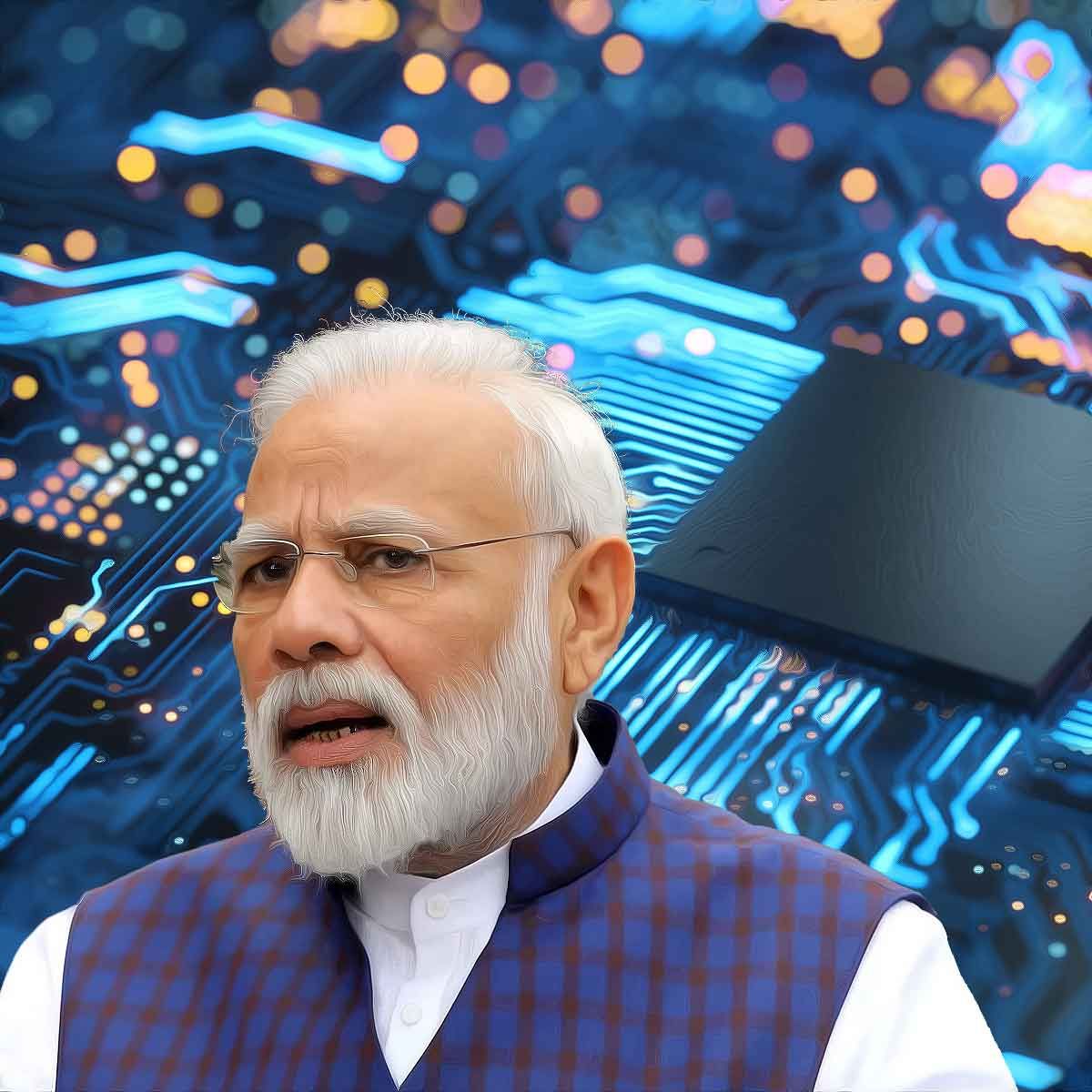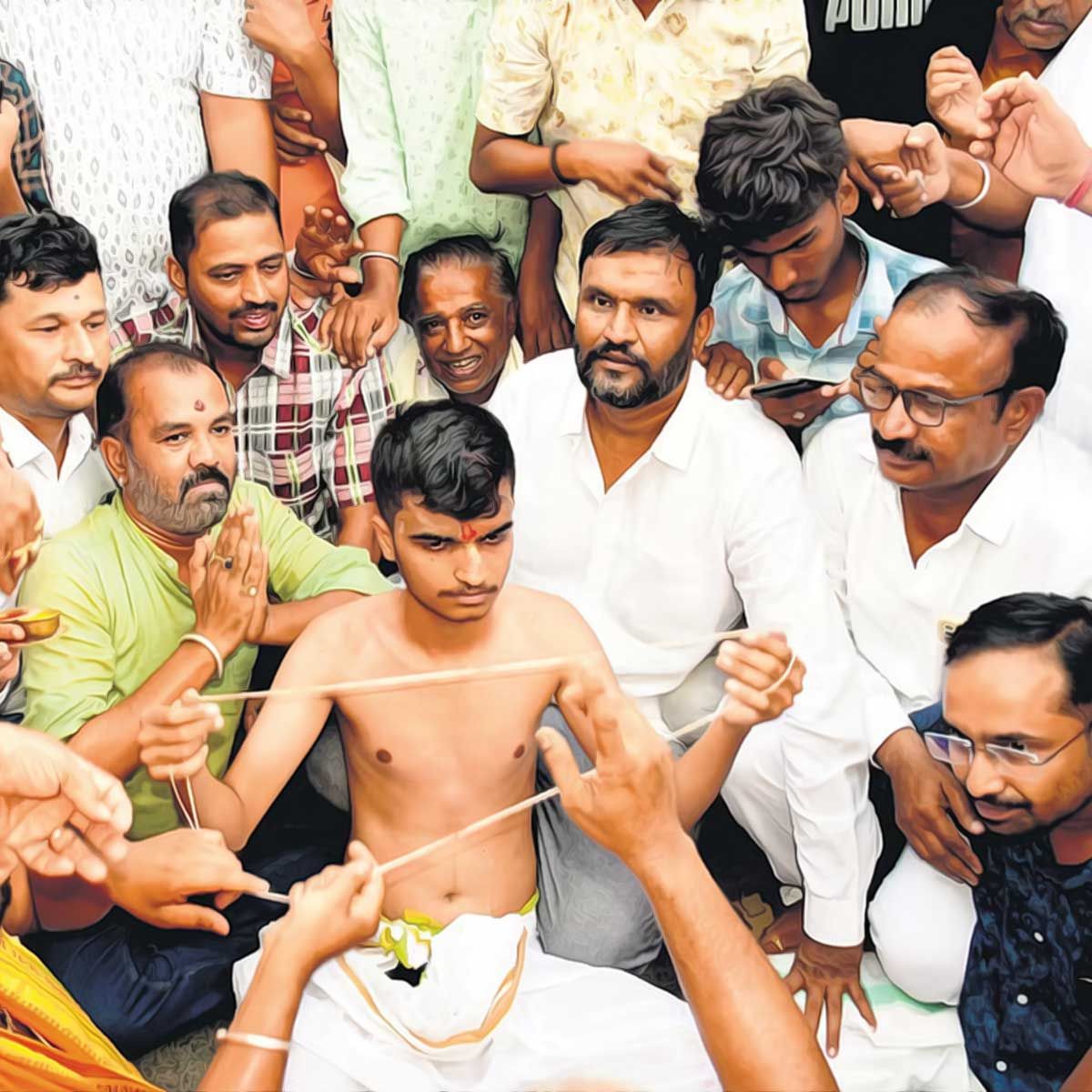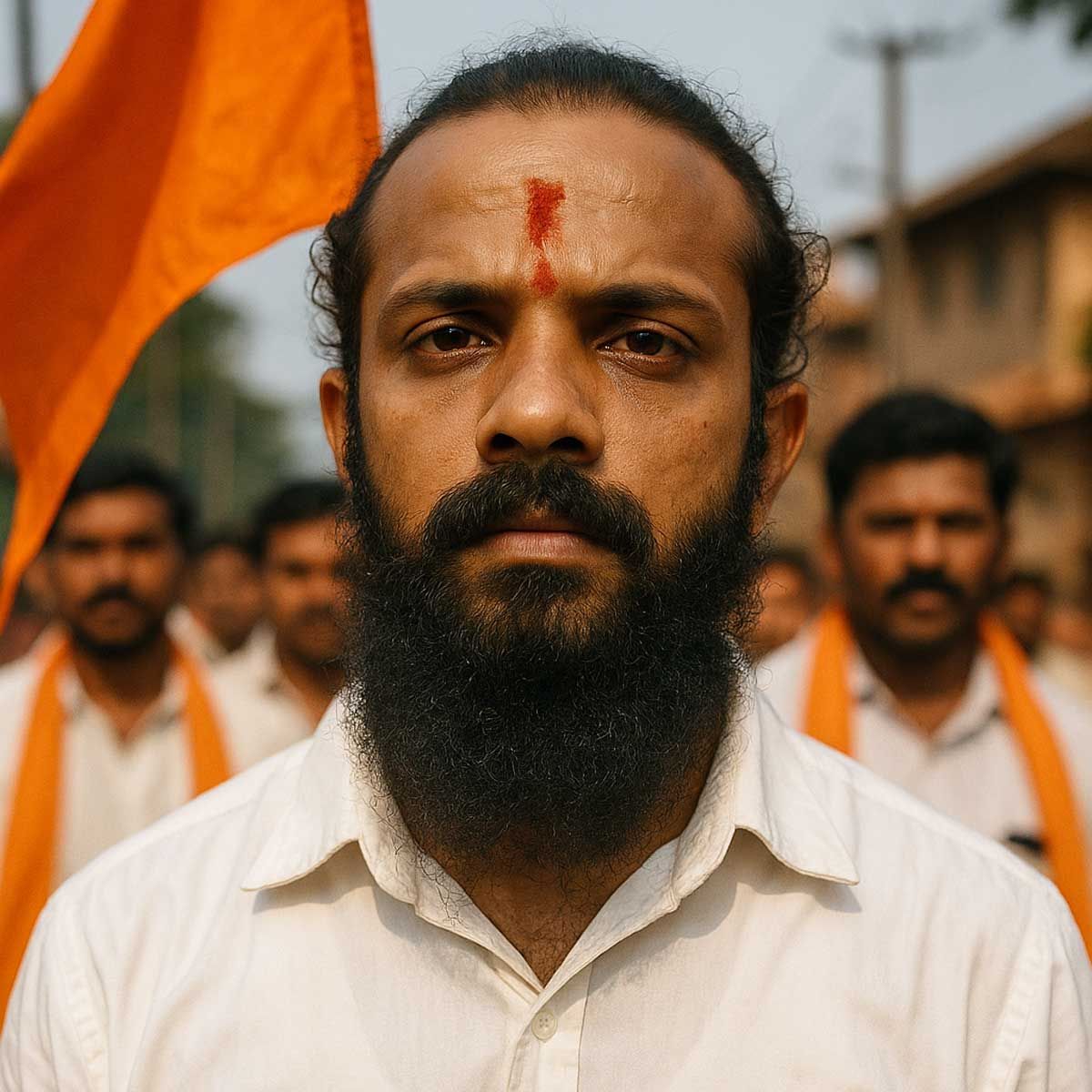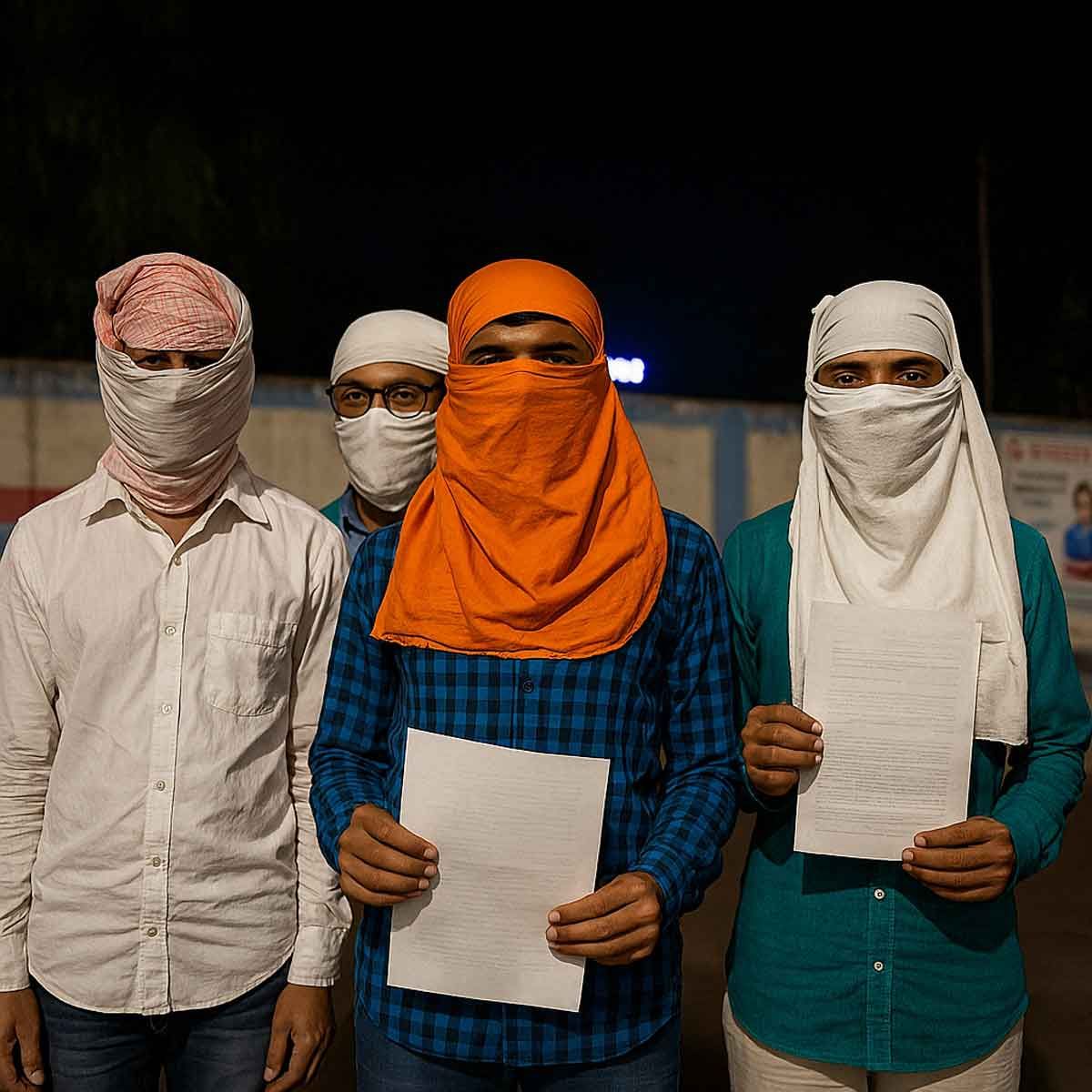More Coverage
Twitter Coverage
Satyaagrah
Written on
Satyaagrah
Written on
Satyaagrah
Written on
Satyaagrah
Written on
Satyaagrah
Written on
JOIN SATYAAGRAH SOCIAL MEDIA
"Global trust, local talent: India's invitation to the semiconductor world": PM Modi announces that India's moment has arrived in the semiconductor, Global leaders unite in praise as India gets ready to take center stage in the semiconductor industry

India's Prime Minister Narendra Modi boldly declares the nation's readiness to become a trusted ally in establishing a global hub for chip manufacturing. This sentiment was expressed during his address at SemiconIndia 2023, a high-profile event held in Gandhinagar, Gujarat, and comes at a time when global tech giants are looking for fertile grounds to grow their investments.
|
India, as he noted, is poised to step up and supply the world with semiconductor chips, a crucial component in today's technologically advanced world. PM Modi's ambitious vision underlines the country's commitment towards realizing its global responsibilities. The nation has been actively working on a strategic roadmap in collaboration with friendly countries around the globe.
The majority of global chip production is currently concentrated in a small number of places, with Taiwan being a prominent player. However, PM Modi is keen on repositioning India as a manufacturing hub, diversifying the semiconductor industry landscape.
PM Modi recalled the early days of India's semiconductor journey during the first Semicon, when there were several concerns about investing in India's nascent industry. The narrative, he noted, has remarkably shifted within a year, from 'Why invest in India?' to 'Why not invest in India?' This change is a testament to the concerted efforts of industry leaders who believed in India's potential and have since intertwined their aspirations and plans with the nation's capabilities and vision.
The Prime Minister, in his address, expressed his conviction that India never fails to meet expectations. With the backdrop of significant global events, such as the Covid-19 pandemic and the ongoing Russia-Ukraine conflict, PM Modi highlighted the world's increasing need for a reliable supply chain. He confidently declared that no partner could be more trustworthy than the world's largest democracy, India.
|
He took pride in the growing global confidence in India. The robust trust quotient is fueled by several factors: India's stable, responsible, and reform-oriented government; the impressive infrastructural developments across various sectors; and the massive talent pool that can support tech sectors, including the semiconductor industry.
The Prime Minister emphasized the abundant opportunities that India of the 21st century presents. He referred to the "3D" advantages - democracy, demography, and dividend, as factors that will multiply business prospects in the country.
India's rapid technological development has been extraordinary. He recalled that in 2014, the nation's electronic manufacturing industry was valued at less than 30 billion dollars, which has now crossed the 100 billion dollar mark. The export of electronics and mobile devices has seen a spectacular growth, doubling over the past two years.
The contrast is striking when we consider that in 2014, India had only two mobile phone manufacturing units. Today, the number has skyrocketed past 200, proving India's rapid progression in the tech industry. The increasing number of broadband users, which leaped from 6 crores to 80 crores, and the internet connections, which rose from 25 crores to over 85 crores, point towards India's digital revolution and the associated business potential.
With reference to the global Industrial 4.0 revolution, PM Modi drew parallels between this movement and the American Dream, suggesting that Indian aspirations are the driving force behind the country's development. He firmly believes that Indian dreams are fuelling the nation's advancement, whether in sectors like health, agriculture, or logistics.
|
India, according to the Prime Minister, is resolute in its mission to optimally utilize smart technology. He pointed out that the chip-making industry is ripe with opportunities, and early movers stand to gain significant advantages.
The Prime Minister acknowledged the skilled engineers and designers as India's strength and expressed faith in India's potential to be an integral part of the world's most dynamic and cohesive market. The 'Make in India' campaign, he asserted, is not just about manufacturing in India, but also involves making products for India and the world.
Educational initiatives, such as revamping the engineering curriculum to support the semiconductor ecosystem, are being undertaken. Over 300 prestigious colleges have been identified to offer semiconductor courses. A 'Chips-to-Startups' Program aims to foster talent, anticipating the creation of over a lakh design engineers in the next five years. This, along with India's burgeoning startup ecosystem, will fortify the semiconductor sector.
Recognizing the significant electrical requirements of the sector, PM Modi proudly informed that India's solar power installed capacity has seen a 20-fold increase over the last decade, with a new target of achieving 500 GW of renewable energy capacity by the end of this decade. He also discussed strides taken towards the production of solar PV modules, green hydrogen, and electrolyzers.
Under the revamped Semicon India Programme, technology firms will now receive 50% financial assistance for setting up semiconductor manufacturing facilities in India. PM Modi affirmed the government's commitment to continuous policy reforms for boosting the growth of India's semiconductor sector.
The Prime Minister tied his message to India's G20 theme, 'One Earth, One Family, One Future,' expressing his belief that India's semiconductor ambitions reflect the same spirit. He emphasized India's desire to let the world benefit from its skill, capacity, and capability, reaffirming the nation's potential for "Global Good and a better world."
Today we are 12 generations behind in Chip Manufacturing Technology: MoS Rajeev Chandrasekhar
In a significant development on the national stage, Union Minister of State for Skill Development and Entrepreneurship and Electronics and IT, Rajeev Chandrasekhar, commented that India's opportunity to become a major player in the semiconductor industry was missed due to a lack of political foresight and strategic acuity from previous governments.
His remarks came during an interaction prior to the second edition of the SemiconIndia Conference, a prominent event for the industry scheduled to commence on June 27, in Gandhinagar, Gujarat. The minister's candid and insightful comments paint a vivid picture of the political landscape that contributed to India's current position in the semiconductor sector.
Chandrasekhar was adamant in highlighting how the Narendra Modi-led government has worked tirelessly to rebuild India's electronics ecosystem from scratch. This effort has led to India becoming one of the fastest-growing electronics manufacturers on the global stage. It's a commendable achievement that attests to the strategic vision and leadership of the current administration.
Beyond the strides already taken, the Minister highlighted the current opportunity that India holds in the semiconductor sector. This opportunity is significant, and the Government is resolute in its determination to harness it fully, signifying a decisive shift from past policies and approach.
Reflecting on the journey thus far, Chandrasekhar stated, “It has been 15 months since we initiated the development of the semiconductor ecosystem. The previous lack of political vision, strategic planning, and the litany of missed opportunities over the decades have been a bottleneck to India's progress in the semiconductor industry."
The Minister spoke with optimism and resolve about the future. "Today, we are at a point where we can achieve in the next decade ('Techade') what some of our neighbouring nations have taken 30 years and USD 200 billion to accomplish, and even then, failed to fully achieve," he stated with firm confidence.
He recognised the role of semiconductors as the bedrock of today's digital world, given the surging demand for electronics, digital products and services. He noted that under Prime Minister Narendra Modi's leadership, India has rebuilt its electronics ecosystem, and we are now among the world's fastest-growing electronics manufacturers.
Taking a stroll down memory lane to the 1960s, Chandrasekhar pointed out the failures of the past. He stated, “India has repeatedly missed the bus on electronics and semiconductors due to a lack of strategic and political vision, accompanied by a hefty dose of incompetence."
Drawing attention to a few stark examples of missed opportunities, he continued, "Fairchild Semiconductors, the company that would later give rise to Intel, visited India in 1957 to set up a packaging unit. However, they were discouraged and subsequently established Asia's largest packaging hub in Malaysia instead. Similarly, a local fab for silicon and germanium transistors was set up but was later closed."
Additionally, he pointed out how India's leading VLSI facility, Semi-Conductor Laboratory (SCL), was rendered defunct after a mysterious fire halted production for nearly eight years, from 1989 to 1997. In a more global context, the minister expressed his disappointment, stating, "In 1987, India was just two years behind the most advanced chip manufacturing technology. Fast forward to today, and we are lagging behind by 12 generations. That's the staggering extent of the gap in our national capabilities in the semiconductor sector."
Chandrasekhar also brought to light the substantial employment opportunities lost to neighbouring nations that provided incentives to global semiconductor companies. On a positive note, he expressed optimism about India's current investments and collaborations with significant semiconductor companies.
Speaking about missed opportunities, he said, "Major international semiconductor companies had shown interest in starting operations in South India. Despite hiring experts and setting up a cleanroom, the project faced numerous hurdles. As a result, the project relocated to China, and India lost out on a semiconductor facility and 4,000 jobs."
Conversely, he highlighted the investment by Micron, a global giant in the semiconductor memory space. He said, "Micron's $2.75 billion ATMP project in Gujarat is expected to generate at least 5,000 new direct jobs and another 15,000 in the community, showcasing the potential that the sector holds for India."
 Support Us
Support Us
Satyagraha was born from the heart of our land, with an undying aim to unveil the true essence of Bharat. It seeks to illuminate the hidden tales of our valiant freedom fighters and the rich chronicles that haven't yet sung their complete melody in the mainstream.
While platforms like NDTV and 'The Wire' effortlessly garner funds under the banner of safeguarding democracy, we at Satyagraha walk a different path. Our strength and resonance come from you. In this journey to weave a stronger Bharat, every little contribution amplifies our voice. Let's come together, contribute as you can, and champion the true spirit of our nation.
 |  |  |
| ICICI Bank of Satyaagrah | Razorpay Bank of Satyaagrah | PayPal Bank of Satyaagrah - For International Payments |
If all above doesn't work, then try the LINK below:
Please share the article on other platforms
DISCLAIMER: The author is solely responsible for the views expressed in this article. The author carries the responsibility for citing and/or licensing of images utilized within the text. The website also frequently uses non-commercial images for representational purposes only in line with the article. We are not responsible for the authenticity of such images. If some images have a copyright issue, we request the person/entity to contact us at This email address is being protected from spambots. You need JavaScript enabled to view it. and we will take the necessary actions to resolve the issue.
Related Articles
- "If art is to have a special train, the critic must keep some seats reserved on it": In a momentous event, PM Narendra Modi flagged off Puri-Howrah Vande Bharat Express in Odisha, marking a significant milestone in India's railway infrastructure evolution
- "Innovation is the calling card of the future": Jaldost, a revolutionary airboat by Bengaluru's National Aerospace Laboratories, powers through aquatic weeds, carving the path towards preserving cleaner water bodies, a testament to indigenous innovation
- "In the market's good mood, fortunes are made and dreams are realized": Indian Tractor Sales soar to Unprecedented Heights by hitting all-time-high record of 9.44 lakh units in FY23, up 12% compared to last year, Brands achieve record-breaking figures
- "Magic is the projection of natural energies to produce needed effects": The Elixir of Life: How Uravu Labs extracts drinking water from Air, with a current installed capacity of 1k litres/day, Uravu plans to scale to 1 Lakh litres/day by next 2 years
- "In unity there is strength; in partnership, there's power": India-UAE economic alliance marks turning point in their shared history, CEPA to boost trade, stimulate investments & fortify economies, advancing both nations towards mutual growth & prosperity
- "Research is creating new knowledge, without which there is no progress": National Research Foundation - a visionary initiative by the Indian govt aimed at centralizing funding for scientific & academic research with an ambitious target of ₹50,000 crore
- "Beyond gravity, within safety": ISRO's Gaganyaan mission progresses with Drogue Parachute tests, prioritizing astronaut safety, aiming to send a crew to 400 km orbit for 3 days, it utilizes Human Rated LVM3 and comprehensive training in Bengaluru
- "Cyberspace undeniably reflects some form of geography": Ashwini Vaishnaw launched "Bharat 6G Alliance" for better collaboration between Govt, industry and academia in developing indigenous 6G products, India already has 200+ patents for 6G
- "A lotus symbolizes purity amidst adversity": Introducing 'Namoh 108', a new variety of special lotus with 108 petals from Lucknow's CSIR-NBRI, it's not just a flower, but a tribute to India's traditions, plus, it blooms longer than other lotuses
- "Tech Tycoon Tango": OpenAI, the brain behind ChatGPT, says 'game over' to CEO Sam Altman, Co-founder Greg Brockman follows suit, bidding adieu; board's 'confidence vote' seems more like a plot twist in a tech thriller. Who's scripting this, AI or humans?
- "New dynamism in ties": In Jakarta, PM Modi calls for a new rules-based order in the post-Covid era, emphasizing the critical role of the ASEAN-India partnership in shaping the resurgence of Asia in the 21st century and fostering global growth
- Highest annual Foreign Direct Investment inflow of USD 83.57 billion recorded by India in FY21-22, IT sector bags the largest share: proves that India is growing as a desirable destination for international investment
- Semiconductor Titans, Micron, Applied Materials, and Lam forging robust alliances with India, unveiling monumental billion-dollar investments to significantly bolster India's Semiconductor Mission and usher a future of unprecedented tech advancements
- “Is artificial intelligence less than our intelligence?”: In a magnificent leap forward, behold the unveiling of India's first autonomous wonder vehicle amidst the remarkable symphony of innovation, the zPod, by the Bengaluru-based startup Minus Zero
- The legend and a genius that was Jagadish Chandra Bose: Champion of East and West Who Almost Invented the Radio




























